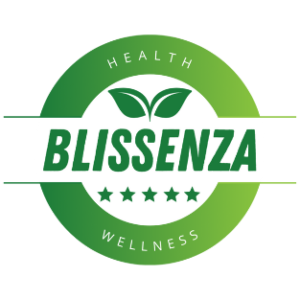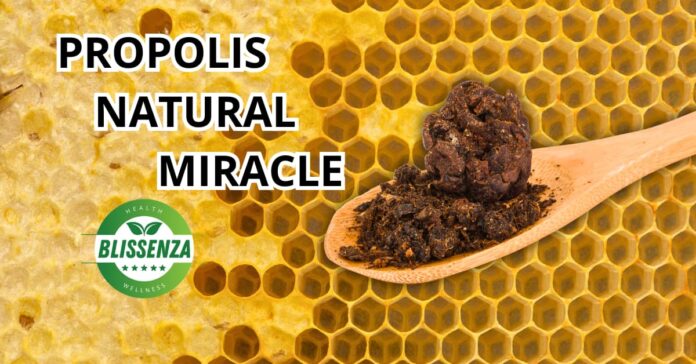Did you know that bees not only provide us with honey but also with a powerful natural ally for our health? Propolis, also known as ‘bee glue,’ is revolutionizing natural medicine with its antioxidant, antimicrobial, and other properties.
Today, we’ll share all these science-backed benefits of propolis.
Propolis is a substance that along with beeswax, forms the structure of hives, bees produce propolis using their saliva, natural wax, flowers, sap, and other natural sources.
The appearance of bee propolis is somewhat unusual, resembling glue, which is why many people call it “bee glue”, it has a dark brown color, although this can vary depending on the natural source the bees used to create the hive.
What Role Does Propolis Play in the Hive?
Nature is wise and rarely wrong. Bees use propolis to seal pores and smooth surfaces in the hive, protecting it from diseases and preventing parasite invasions, this is thanks to its antimicrobial and antifungal properties.
Just as propolis seals and protects the hive, it acts in our body as a natural barrier against infections, strengthening immune defenses, according to several studies we’ll share below.
The Ancient Use of Bee Propolis
The use of bee propolis dates back over 2,000 years, ancient civilizations such as the Romans and Greeks used it to treat skin problems like wounds, abscesses, or minor burns, effectively preventing infections.
The term “propolis” comes from two Greek words: pro (to defend) and polis (city), this term suggests that bees use propolis to defend the entrance to their hives or “cities.”
In ancient China, propolis was used as a cosmetic product, it was applied to the skin, and people claimed it helped whiten the complexion.
The Egyptians used it to embalm mummies due to its antimicrobial and antifungal properties, which protected the body of the deceased; Since then, the use of bee propolis spread across Europe.
Finally, in traditional Andean medicine, propolis was used to treat respiratory infections and maintain health in extreme climates.
Benefits and Properties of Propolis
Propolis as an Antioxidant
One study found that propolis has an antioxidant capacity very similar to ascorbic acid (vitamin C). Because of this, it can effectively combat free radicals, which cause damage to the body’s cells (1); Free radicals are unstable molecules that can damage our cells and accelerate aging, the antioxidants in propolis neutralize these molecules, promoting healthier skin and preventing chronic diseases.
An analysis of propolis revealed that it contains over 300 compounds, including polyphenols called flavonoids, which act as antioxidants like ascorbic acid (2). Furthermore, various studies have concluded that polyphenols can reduce the risk of heart disease (3)(4) and prevent blood clots, among other health benefits (5).
Propolis Against Cancer
Propolis has been proven to block the proliferation of various cancer cells (6). Another study confirmed that propolis prevents the multiplication of cancer cells, it also found that it reduces the likelihood of healthy cells becoming cancerous and prevents cancer cells from communicating with each other.
A publication from the University of Nevada in the United States tested a compound in propolis called caffeic acid phenethyl ester (CAPE) against oral cancer, the results were very positive, showing a 60.6% inhibition of cancer growth and a 35.4% reduction in viability; These findings prompted researchers to call for further exploration of propolis as a foundation for alternative therapies.
In addition to CAPE, other compounds in propolis such as galangin, cardanol, chrysin, nemorosone, and artepillin C, have been identified as potential antitumor agents. Propolis has also been shown to be effective against breast, brain, colon, kidney, prostate, pancreas, skin, and blood cancers (7).
Propolis as a Natural Antibiotic
Many people worldwide are developing resistance to antibiotics, this happens when viruses causing illness mutate to survive certain medications; The World Health Organization has called this issue “one of the greatest threats to global health.”
Propolis offers hope for this problem. A study found that propolis and its derivatives have “many natural antimicrobial compounds with a broad spectrum against different types of bacteria and also improve the efficacy of conventional antibiotics.” Propolis has also shown effectiveness against common bacteria like Staphylococcus aureus and E. coli.
Another study confirmed this with positive results: researchers administered propolis and cefixime (an antibiotic) to mice infected with salmonella, they discovered that propolis worked synergistically with cefixime, enhancing their combined effects beyond what either provided individually.
Propolis for Treating Viral Infections
Among the benefits of propolis, we also find its great antiviral capacity; Many people, especially beekeepers, use a little propolis under their tongue when they feel a sore throat and claim it works very well.
For example, a study demonstrated that the flavonoids in propolis help inhibit viral replication and stimulate antibody production, accelerating recovery.
How to Combine Propolis with Other Natural Remedies for Maximum Effect
Propolis can be even more effective when combined with other natural remedies:
- Raw Honey: Its antimicrobial and antioxidant properties complement the antiviral effects of propolis. A teaspoon of honey with a few drops of propolis extract is ideal for soothing an irritated throat and boosting the immune system.
- Fresh Ginger: This anti-inflammatory helps combat congestion and improve circulation. Prepare a tea with fresh ginger, honey, and propolis drops for a comforting and effective remedy.
- Lemon: Rich in vitamin C, lemon strengthens the immune system. Mix lemon juice with honey, propolis, and warm water for a revitalizing drink.
- Cinnamon: This ingredient adds a warm flavor and has antimicrobial properties that align with those of propolis. Drinking a cinnamon tea with honey and propolis is perfect for chilly nights.
This combination of remedies not only helps alleviate cold symptoms but also provides comprehensive care for the body during the recovery process, so if you feel the first signs of a cold, such as a scratchy throat or nasal congestion, a daily dose of propolis in the form of drops or a spray can be the ideal solution.
An article published in February 2021 shared significant research on bee propolis and concluded that bee propolis is safe and “exerts antiviral and immunomodulatory activity” based on the following findings:
- In mice, bee propolis reduced the damage caused by the herpes simplex virus (8).
- In humans, a study was conducted on three groups of men and women suffering from herpes simplex virus 2, one group received an ointment made from propolis flavonoids, while the others received a placebo ointment. The group using the propolis ointment experienced faster healing of lesions and fewer instances of infection.
This shows that individuals with herpes can benefit from a topical propolis solution.
When tested in vitro against the influenza virus, the components present in propolis were found to “suppress viral replication” (9).
Another clinical trial evaluated the effects of propolis on individuals suffering from “dengue hemorrhagic fever.” Researchers formed two groups for this study: one group consumed placebo capsules, while the other took capsules containing propolis. After seven days, tests revealed that the propolis group experienced an increase in platelet levels, whereas the placebo group showed no significant change. These findings confirmed yet another benefit of bee propolis.
Scientists also tested propolis on viruses affecting animals, such as Newcastle disease, which primarily impacts birds. They compared two groups: one received the traditional vaccine, while the other was given a liposomal propolis flavonoid vaccine. The results showed that birds vaccinated with the propolis-based vaccine exhibited increased antibody levels and achieved the highest efficacy.
Propolis in Mouthwashes: A Natural Shield Against Dental Problems
Propolis has become a key ingredient in oral care products due to its antimicrobial, anti-inflammatory, and antifungal properties. Studies have shown that propolis is effective against bacteria like Streptococcus mutans, responsible for cavities, and Porphyromonas gingivalis, linked to gingivitis (10)(11).
In mouthwashes, propolis acts as a natural barrier against plaque accumulation and the proliferation of harmful bacteria, protecting teeth and gums from infections, additionally, its antioxidant compounds reduce gum inflammation, making it particularly useful for treating gingivitis and preventing more severe conditions like periodontitis.
Another significant benefit of propolis for oral health is its ability to combat bad breath; The bacteria that cause halitosis are effectively eliminated thanks to the antimicrobial properties of propolis, leaving the mouth feeling fresh and clean for longer.
How to use propolis for oral care:
- Homemade mouthwash: Mix a few drops of propolis extract with warm water to create a natural mouthwash. Use it after brushing your teeth to enhance hygiene and protect your gums.
- Commercial mouthwashes: Some mouthwashes already include propolis as a key ingredient, make sure to look for natural products containing propolis to enjoy its full benefits.
Regular use of mouthwashes with propolis not only improves oral health but also strengthens protection against bacteria and fungi, promoting comprehensive and sustainable oral care.
Propolis for Combating Stomach Infections and Protecting the Gut
Propolis has proven to be a natural ally in treating stomach infections caused by Helicobacter pylori, a pathogen associated with chronic gastritis, gastric ulcers, and even stomach cancer (12).
In addition to combating this bacteria, propolis protects the digestive system by fostering a healthy balance of intestinal microbiota (13)(14), its selective antimicrobial properties help eliminate harmful bacteria while preserving beneficial bacteria essential for proper digestion and a strong immune system.
How to use propolis for digestive health:
- Liquid extract: Dilute a few drops of propolis extract in warm water and consume before meals to protect the stomach and combat H. pylori.
- Capsules: Propolis supplements in capsule form are easy to incorporate into your daily routine.
- Honey with propolis: Combining raw honey with propolis enhances anti-inflammatory and antimicrobial benefits, helping to alleviate symptoms of stomach infections.
Regular use of propolis as part of a comprehensive digestive care strategy not only helps fight stomach infections but also promotes a healthy and resilient digestive system.
Propolis and COVID-19
To date, hundreds of studies have explored the effectiveness of propolis against various viruses and bacteria; Similarly, research on the action of propolis against coronaviruses is ongoing, and we will share some of these findings below.
The first documented case of coronavirus in humans occurred in 1965, causing a common cold, however in late 2019, a new coronavirus emerged: severe acute respiratory syndrome coronavirus 2 (SARS-CoV-2), the virus responsible for COVID-19.
As of the publication of this article, four clinical trials involving propolis and COVID-19 are underway, with only one completed to date, we share the results below and will update this article as new findings become available, make sure to bookmark or save it to your favorites.
Additionally, we believe it is valuable to share studies conducted on propolis and other coronaviruses, as they can help us understand the potential of propolis against this class of viruses.
Flavonoids found in propolis have also been shown to have an inhibitory effect on certain coronavirus strains, according to a study conducted in 1990 (15).
These flavonoids prevent the viral cycle from completing in infections caused by severe acute respiratory syndrome (SARS) and Middle East respiratory syndrome (MERS-CoV); Additionally, another compound in propolis, known as caffeic acid phenethyl ester (CAPE), has anti-PAK properties, targeting enzymes essential for human viral entry and replication (16)(17).
This anti-PAK property in propolis has been recognized as a potential therapy against COVID-19, as noted in a study published in 2020.
Another study revealed that components of propolis exhibited an inhibitory effect on the angiotensin converting enzyme (ACE). In a related study conducted in 2020, a group of epidemiologists from Oxford University concluded that individuals consuming inhibitors of these enzymes had a lower risk of contracting COVID-19 (18).
Given these findings, both scientists and epidemiologists agree that further research is essential, in addition to the ongoing studies, to better understand the direct effects of propolis on SARS-CoV-2, starting with in vitro experiments.
Propolis as a Vaccine Adjuvant
Other successful studies carried out by the scientific community involve the use of propolis as a vaccine adjuvant to strengthen the immune response against various viruses and bacteria, ensuring long-term protection (19).
Propolis has also been shown to make our immune system work more effectively “when the immune response is insufficient to control an infection or specific pathological condition and is pathologically diminished/compromised” (20).
Propolis for Acne Problems
Thanks to its antibacterial and anti-inflammatory properties, propolis is an excellent option for treating acne and preventing future breakouts.
A study published by Tanta University in the Egyptian Journal of Dermatology and Venereology shared the results of tests conducted on 40 people with acne problems. Researchers divided the participants into two groups and conducted bacteriological exams before and after treatment to assess the antimicrobial properties of propolis. They treated one group with an ethanolic extract of propolis and the other with ethanol alone.
The group that used the ethanolic extract of propolis saw an improvement of up to 75% in acne lesions, while the ethanol group showed less than 25% improvement.
Propolis for Wounds
Propolis also has properties that make it useful for treating wounds and burns, this is due to a compound called pinocembrin, which acts as an antifungal. Combined with its anti-inflammatory capacity, it creates the perfect combination for wound care.
Moreover, a study concluded that propolis helps accelerate the growth of new cells, benefiting individuals who have suffered burns.
Propolis and Blood Pressure
A six-month clinical trial conducted at Mosul University examined the effects of propolis on blood pressure; it found that propolis significantly reduced systolic and diastolic blood pressure compared to pre-supplementation levels and control groups.
Based on this evidence, we believe it’s better to use propolis as a preventive treatment. Of course, if a condition already exists, propolis may help speed up recovery, just as it has shown effectiveness in acne treatment.
Precautions
If you’ve previously experienced allergies to bee stings or honey consumption, it’s likely you may also have an allergic reaction to propolis, in such cases, we do not recommend using it. Likewise, consult your doctor or healthcare professional before using propolis if you have asthma.
Most individuals can safely use propolis; however, experts recommend that pregnant women exercise caution because researchers have not conducted conclusive studies for this demographic.
The evidence is clear: people have proven the efficacy of propolis repeatedly over thousands of years. Today, experts do not classify it as a high-risk supplement.
We hope you’ve found this information valuable, we encourage you to incorporate propolis into your daily routine and discover how this natural gift from bees can transform your well-being. Try it, share it, and take care of your health with the help of nature!




